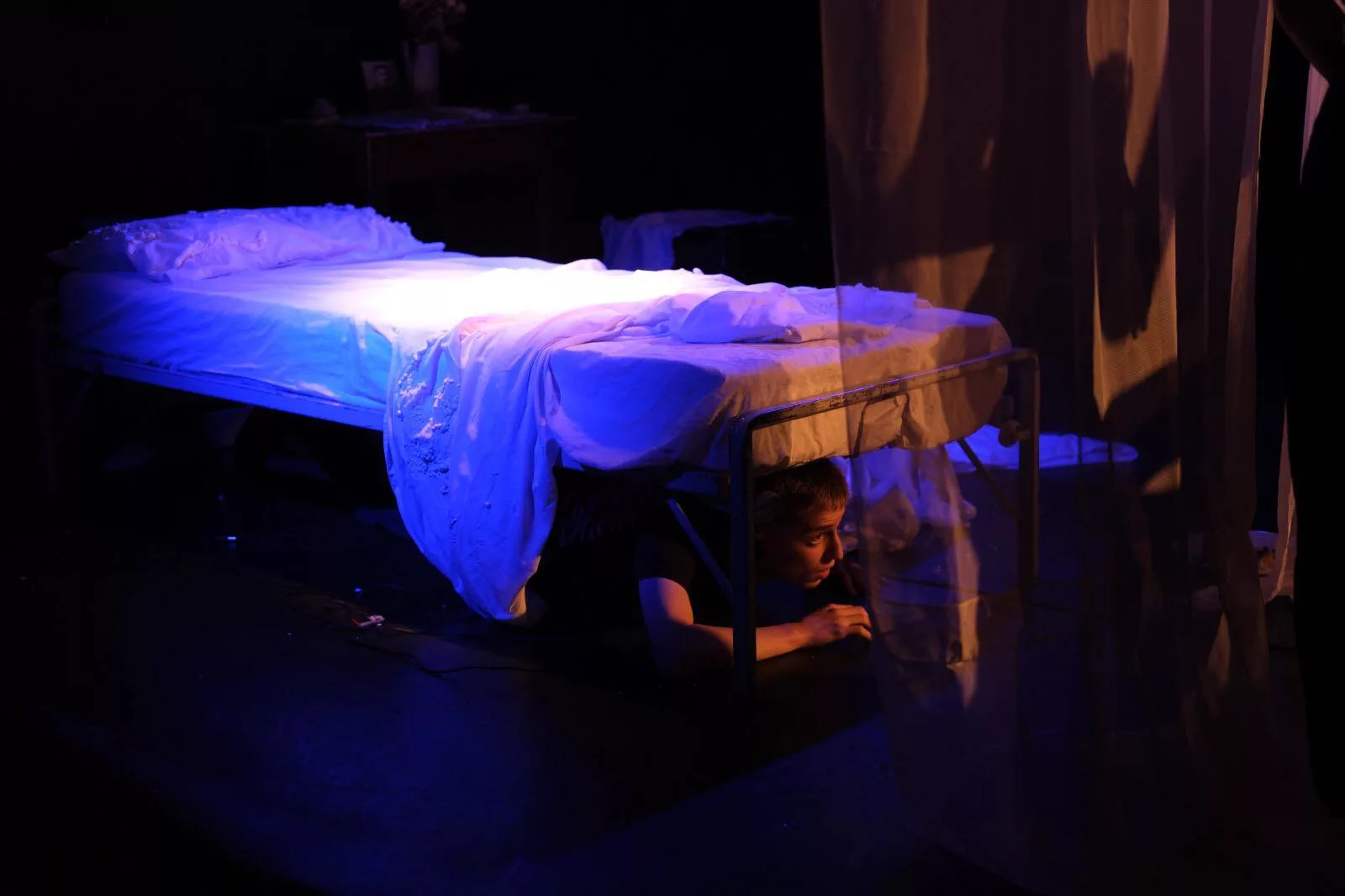If you were exposed in any way to Matchbox Productions’ The Metamorphosis this term, the words ‘binaural sound system’ probably accompanied it. For the uninitiated, it’s a fancy phrase for headphones. So, as the last members of the audience squeezed into a packed Pilch, I sat taking in the whispers of Sonya Luchanskaya: ‘You should be hearing this in your left ear.’ ASMR eat your heart out.
This course of action – fiddling, people-watching, ASMRing – was so enjoyable to me that it was only after a good five minutes that I decided to scrutinise the set: a table, already scattered with a messy ensemble of plates, and a floor-length net curtain, behind which was a bed, and a small stand with a charming photograph of Franz Kafka himself. And, of course, the barely visible, and apparently lifeless body of Gregor Samsa (Joe Rachman), as he slept.
Making excellent use of binaural sound (by Alva Orr), The Metamorphosis is delivered (as is done in Kafka’s novella) as the internal monologue of our protagonist, Gregor. The visual perspective is, however, reversed: in the novella, we follow Gregor’s voice, yet director Lily Berrell’s production inverts this, with the actions of the family taking the foreground. The effect of this was interesting, as Gregor is cordoned off in a way which allows the audience to forget him periodically, just as his family slowly begins to. However, Rachman’s constant movement never allowed us to truly forget he was there: here he was in paroxysm, there he stood contorted into one of many “bug positions” (as Rachman described in an interview with Cherwell). This inversion of perspective also allowed the character of Greta Samsa (Juliette Imbert) to take on much greater importance, and rightly so, given her place as Gregor’s caregiver. Imbert did an excellent job of the role, conveying Greta’s slow growth (or decline) from naïve, devoted sister, to chronically irritated, Gregor-hating “fine young lady” (in the words of her parents).
The excellent performances of Gregor and Greta, at the centre of the play, were complemented by the mother-father act, comprising the well-meaning Frau Samsa (Millie Deere), and the stalwart Herr Samsa (Jo Rich). Deere shone in her role, playing the scorned wife, the overbearing mother, as well as the disgusted keeper of a house infected by the “thing” that is Gregor. Berrell performs a master-stroke in leaving Gregor as just that, a “thing”, allowing the metamorphosed character to retain all the ambiguity of form that Kafka intended. Although, in English translation, Gregor is often made a cockroach, Kafka made no such elucidation, and so, we see Rachman slightly bruised up, but with no discernible ‘insect’ costuming: he is stripped down to a pair of white underpants, and his acting does all the work.
The family stay on stage for most of the performance, with no discernible shifts in set or in personage as the play progressed. The temporality of the play was, therefore, masterfully contrived: episodes shifted from one to the other fluidly, months of narrative passed by in what was only a handful of scenes and 45 minutes of performance. The production was well punctuated by the swift entries and exits of the Clerk (Hal Gavin), and then the Lodger (Susie Weidmann). Both burst onto the stage, acknowledging the audience and scrutinizing us as though we were a collection of bric-a-brac on a shelf, and garnering rounds of laughter for their over-the-top roles.
The Metamorphosis was, understandably, intense, and weird – in a good way. Blessed with excellent performances, and clever use of technology, the play captured all the absurdity of Kafka. All in all, a wonderful and careful adaptation of the novella which, as any good adaptation should, took the source material, and ran with it.



